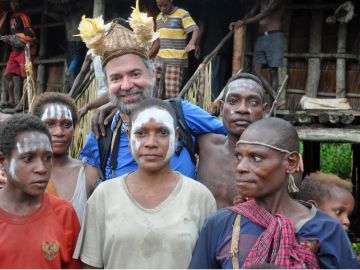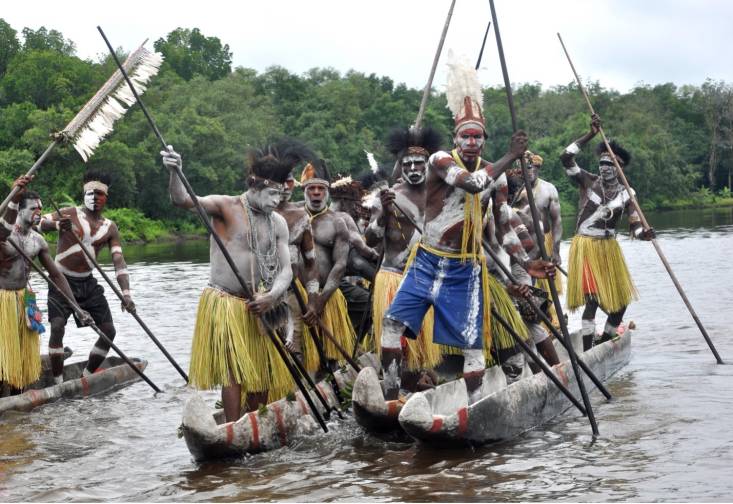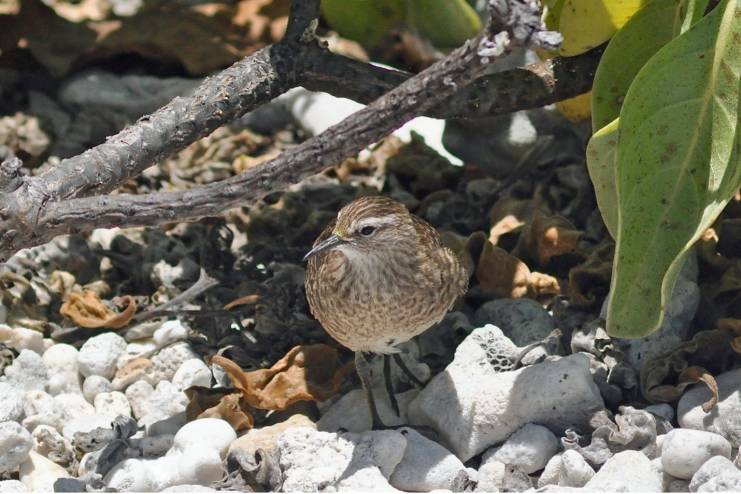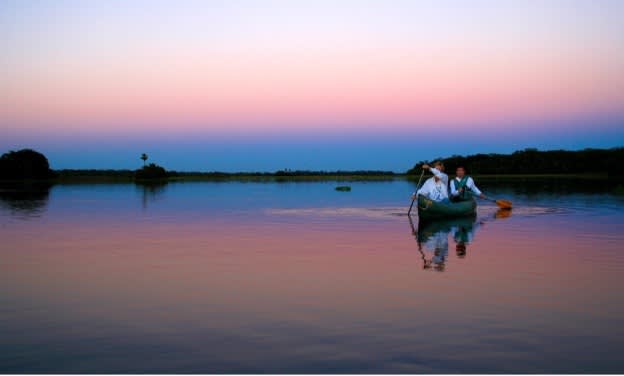
Meet the Expert: Pepper Trail, Ornithologist
Pepper grew up in the Finger Lakes region of New York State, on a wonderfully dilapidated 100-acre farm. A family trip to Mexico when he was 12 instilled a lifelong love of travel, which has taken him to all seven continents and across the oceans of the world. He earned his Ph.D. from Cornell University for his field study of the mating behavior of the spectacular Guianan cock-of-the-rock in Suriname, and he’s since carried out fieldwork on bird behavior and conservation in the Caribbean, Panama, Polynesia, and Vietnam. A Fellow of the American Ornithological Society, Pepper lives in Ashland, Oregon, where he works at the National Fish and Wildlife Forensics Laboratory. As the nation’s only forensic ornithologist, he is responsible for identifying all bird remains submitted in investigations of federal wildlife crimes and testifies as an expert witness in courts around the US. However, Pepper much prefers living birds, and his enthusiasm and sense of humor give birders and non-birders alike a new appreciation for the wonders of the avian world.
We recently had the opportunity to do a quick Q & A with Exodus Travels Ornithologist, Pepper Trail, to learn more about his background, interests, favorite expedition moments, travel bucket list, and more. We hope you enjoy discovering more about one of our expert expedition team members!

Where are you from and where have you lived?
I grew up in the Finger Lakes region of upstate New York. Since then, I have lived in Suriname, Panama, American Samoa, and San Francisco. I have been living in Ashland, Oregon since 1994.
Tell us about yourself—what path led you to becoming an Expedition Travel Leader?
I got involved in international tour leading way back in the 1980s, as a research associate of the California Academy of Sciences in San Francisco. I led two programs for them to East Africa through an expedition tour operator and that experience led to connections with other international tour companies. I led my first trip with Zegrahm Expeditions which was Exodus Travels’ sister company in 2007. Because I still have a full-time job with the US Fish and Wildlife Service (until the end of 2020, when I’ll retire!), I’ve usually only been able to do a couple of trips a year—and they are always the highlights of my year!
What other jobs, positions or credentials do you have?
I received my Ph.D. in ornithology from Cornell University, followed by post-doctorates from the National Science Foundation, the Smithsonian Tropical Research Institute, and the California Academy of Sciences. Since 1998, I have been the senior forensic ornithologist for the US Fish and Wildlife Service, at the National Fish and Wildlife Forensic Laboratory in Ashland, Oregon. I’m a Fellow of the American Ornithological Society and a past member of the Board of Directors of the Society for Wildlife Forensic Science.
What other fields are you passionate about?
I am a passionate photographer and am also a widely published poet. One of my three poetry collections, Cascade-Siskiyou: Poems, was a finalist for the Oregon Book Award in Poetry.
Any awards, publications, appearances documentaries, etc. do you have?
I’ve authored over 20 peer-reviewed publications in scientific journals, including Science, Conservation Biology, Animal Behaviour, and Evolution. I have also written many popular articles and essays, in publications ranging from National Geographic and Ranger Rick to High Country News.
What organizations are you a part of?
I’m a member of the American Ornithological Society, the Society for Conservation Biology, and the Society for Wildlife Forensic Science. I’m also active in a number of local environmental groups in southern Oregon.

What is your favorite Expedition Travel memory?
It’s impossible to narrow it down to one, so I’ll choose two: one cultural and one wildlife experience.
Culturally, my most unforgettable day was spent in the Asmat region of New Guinea, where we were greeted by mock-threatening (and truly intimidating) warriors and then welcomed with elaborate and magnificent ceremony.
My favorite wildlife memory may be a surprise—not the penguins of Bailey Head or the birds of paradise of New Guinea (though both those are unforgettable), but the sandpipers of Tenararo Atoll. This tiny island in French Polynesia is one of the last strongholds for the Tuamotu Sandpiper, the world’s only atoll-nesting shorebird. On Tenararo, they are still abundant, and walked around our feet, using their slender bills to probe the Scaevola flowers for nectar, like sandpiper-hummingbirds! An amazing experience.

Can you tell us about a time that you were on an expedition that ended up taking an unexpected turn?
One of the biggest surprises I’ve had on an expedition was while exploring the immense Hindu temple complex at Madurai in India. Deep in the interior of the temple, I turned a corner—and there was an Asian elephant, calmly accepting rupees and bestowing blessings with a gentle touch of its trunk!
In a more educational vein, during a trip to Vietnam, our group was able to have dinner in Hanoi with the U.S. Ambassador, who answered our questions and gave us great insights into that country and its evolving relationship with the United States.
A trip to Japan also provided another unexpected and profoundly moving experience—hearing the witness testimony of a woman who, as a six-year-old child, survived the atom bomb dropped on Hiroshima. I will never forget her trembling hands covering her face as she described the blast.
What non-for-profits or causes do you support or feel strongly about?
Professionally, I have been working to combat the illegal wildlife trade, both in the US and internationally, for over 20 years. On my own time, I am very involved in many conservation efforts, both in my home region of southern Oregon and northern California and internationally. And, Iike all conservation biologists, I am desperately concerned about climate change.
What are your top three countries or regions in the world to explore?
Antarctica and South Georgia
The rainforests and cloud forests of South America
The savannahs of East and South Africa

What’s left on your explorer’s bucket list? Why there?
I’ve been extremely fortunate to visit so many incredible places in the world, but a few still beckon to me. At the top of the list is Madagascar. Then there’s the High Arctic, Namibia, the Pantanal, Laos… I guess there are plenty of places left! Madagascar, of course, for its incredible lemurs and other endemic animals; the High Arctic for polar bears, walrus, and narwhals; Namibia for its wildlife and pristine landscapes; Brazil for Hyacinth Macaws and jaguars; Laos for wildlife and culture. I could go on…
Who is an Expedition Traveler?
The greatest common denominator is curiosity, whether it be about wildlife, geology, history, or culture. Old or young, Expedition-style explorers have an open-minded fascination with the world, and it is a joy to share knowledge and experiences with them.